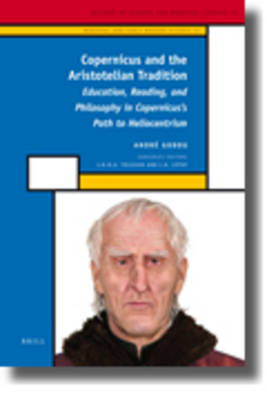
Copernicus and the Aristotelian Tradition
Brill (Verlag)
978-90-04-18107-6 (ISBN)
Taking into account the most important results of the scholarly literature since 1973 and the best Polish scholarship of the past century, this is the first comprehensive study of Copernicus's achievement in English that examines Copernicus's path to heliocentrism from the perspective of late medieval philosophy, the Renaissance recovery of ancient literature and science, and early-modern editions of books that Copernicus used. The principal goals are to explain his commitment to the existence of celestial spheres, and the logical foundations for his views about hypotheses. In doing so, the work elucidates the logical and philosophical background that contributed to his accomplishments, and explains the limitations of his achievement.
Medieval and Early Modern Science, 12
André Goddu, Ph.D. (1979) in History, University of California at Los Angeles, is Professor of History and Philosophy of Science, Department of Physics and Astronomy, Stonehill College. He has published a monograph and several articles on late medieval philosophy and early modern astronomy, including The Physics of William of Ockham (Brill, 1984).
List of Illustrations
Preface
Acknowledgements
Introduction
PART I: COPERNICUS'S EDUCATION IN POLAND
1. Poland, Toruń, and Cracow in the Fifteenth Century
1. Early Education
2. Cracow University
3. Curriculum and Texts, 1475-1500
2. Masters and Students in the 1490s
3. The Teaching of Logic
1. Aristotelian Logic
2. Introductory Orientation
3. The Teaching of Logic at Cracow
4. Natural Philosophy
1. General Orientation
2. Markowski's Most Important and Relevant Conclusions—
3. Quaestiones cracovienses and John of Glogovia on the Physics of Aristotle
4. Aristotle's De caelo, De generatione, Meteorologica, and Metaphysics
5. Johannes Versoris
6. Albert of Saxony and John of Glogovia
5. Humanism and Astronomy
1. Introduction
2. The Curriculum at Cracow
3. The Criticisms of Ptolemaic Astronomy
4. Copernicus's Teachers at Cracow
5. Albert of Brudzewo’s Commentariolum
PART II: COPERNICUS’S EDUCATION IN ITALY, 1496-1503, AND RETURN TO POLAND
6. Copernicus in Italy
1. Introduction
2. Education in Canon and Civil Law
3. Novara
4. Study of Greek
5. Rome
6. Study of Medicine at Padua
7. Degree from Ferrara.
7. Copernicus’s Reading and Progress towards his First Heliocentric Theory
1. Introduction
2. Regiomontanus
3. Bessarion
4. Ficino's Translation of Plato's Works
5. Plutarch, Pseudo-Plutarch, and Giorgio Valla
6. Pliny the Elder and other Ancient Authorities
7. Achillini
8. Commentariolus and the Transfer to Frombork
PART III: COPERNICUS AS PHILOSOPHER
8. Copernicus as Logician
1. Introduction
2. The Sources of Dialectical Topics, 1490-1550
3. Mereology—Logic and Ontology
4. Logic in the Commentariolus
5. The Use of Topics in the Preface to De revolutionibus
6. The Rhetorical Framework of Book I
7. The Use of Topics in Book I
8. Hypotheses in Copernicus's Method
9. The Logical Issues in the Relation between Mathematics and Natural Philosophy
10. The Logical Issues in his Discovery of the Heliocentric Theory
11. Concluding Remarks on Copernicus's Relation to the Aristotelian Logical Tradition
9. Copernicus as Natural Philosopher
1. Introduction
2. Critique of Geocentrism
3. Motions of Celestial Bodies
4. Impetus and the Motions of Elemental Bodies
5. Infinity and the Finiteness of the Cosmos
6. Summary
10. Copernicus as Mathematical Cosmologist
1. Introduction
2. Hypotheses
3. Spheres and the Nature of Celestial Matter
4. Equants
5. Summary
Conclusion and Epilog
1. Summary
2. Copernicus's Interpretation of Aristotle
3. Epilog: Reception of Copernicus's Interpretation
Appendices
Bibliography
Index
| Erscheint lt. Verlag | 25.1.2010 |
|---|---|
| Reihe/Serie | Medieval and Early Modern Philosophy and Science ; 12 |
| Zusatzinfo | 2 Line drawings, black and white; 3 Tables, black and white; 10 Illustrations, black and white |
| Verlagsort | Leiden |
| Sprache | englisch |
| Maße | 155 x 235 mm |
| Gewicht | 1012 g |
| Themenwelt | Geisteswissenschaften ► Geschichte ► Regional- / Ländergeschichte |
| Geisteswissenschaften ► Philosophie ► Logik | |
| Geisteswissenschaften ► Philosophie ► Philosophie des Mittelalters | |
| Naturwissenschaften ► Physik / Astronomie ► Astronomie / Astrophysik | |
| Sozialwissenschaften | |
| ISBN-10 | 90-04-18107-5 / 9004181075 |
| ISBN-13 | 978-90-04-18107-6 / 9789004181076 |
| Zustand | Neuware |
| Informationen gemäß Produktsicherheitsverordnung (GPSR) | |
| Haben Sie eine Frage zum Produkt? |
aus dem Bereich


